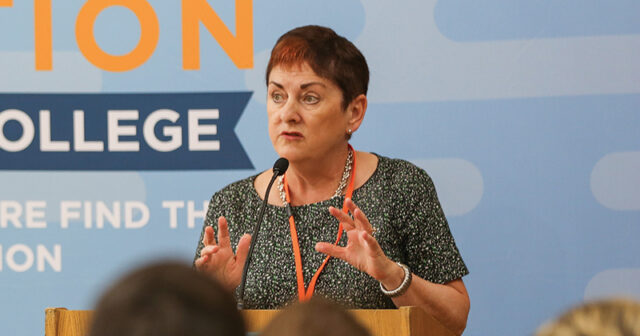The government needs to find an additional £1.3 billion to compensate for inflation pressures faced by schools and protect the education budget by 2022, a think-tank has warned.
The Education Policy Institute claims that this extra cash will need to be found over and above the £4 billion commitment already included in the Conservative manifesto.
Without the extra funds, the think-tank predicts school face a real-terms per pupil reduction of 3 per cent by the end of the parliament.
If the extra funds aren’t forthcoming, the government has been warned they could face another backlash from their MPs in Tory heartlands.
It comes as education secretary Justine Greening has reportedly demanded an extra £1.2 billion from Theresa May to protect school funding.
But there are question marks over where any extra money will come from.
Schools minister Nick Gibb confirmed yesterday that the government had officially U-turned on its controversial pledge to scrap universal infant free school meals.
The unpopular proposal, which included introducing free school breakfasts for primary pupils funded through the money saved by scrapping infant free lunches, was designed to save £650 million. These savings would then be shifted to fund the increase in the school funding pot under the Conservative party’s manifesto pledge.
Gibb also confirmed yesterday that there would be no delay to introducing the new national funding formula (NFF) for schools, and that it be introduced from 2018 as planned.
However EPI has warned that the department won’t be able to implement a “hard” funding formula by totally removing the role of local authorities in school funding by 2020, as planned.
The think tank said this would require legislation, but the Queen’s Speech suggested there would be no education legislation in this parliament.
Instead, EPI said the government could look to “significantly reduce” the role of councils through secondary legislation.
The report stated: “Academies are unlikely to welcome the ongoing (though diminishing) role of local authorities in setting school budgets, but will almost certainly accept this as a consequence of a minority government.”
The government hopes its national funding formula will address historic variations between different parts of the country. But the original plans saw money being moved from over-funded schools, to prop up those under-funded.
The original proposals, as published in December 2016, would have seen 9,128 schools see their budgets cut, while 10,740 schools were set to gain.

The EPI said that if the government does decide to put in the extra £1.3 billion to protect real per pupil spending, then Greening could use some of the extra money to “help ensure that schools in lower funded areas see bigger budget rises”.
The institute added that this might help “persuade more of the government’s own MPs to support the new funding formula”, after many have hit out at the plans.
Gibb added yesterday the government was in the process of looking at the 25,000 responses to its national funding formula consultation, and would respond with its plans in due course.
David Laws, executive chair at the Education Policy Institute, will tell the British Educational Suppliers Association summer insights conferencelater today: “At present, similar schools in similar circumstances can receive very different budgets, and that needs to be addressed through a new, transparent, formula.
“However, as we observed during the general election campaign, schools are increasingly nervous about their financial position due to both the impact of the proposed national funding formula and inflationary pressures.”
He said that if the government wants to address both these issues, it would “need to find a further £1.3bn (over and above its manifesto commitment). This would protect real per pupil spending, and could address the concerns of the lowest funded areas.”







1.3 billion…about as much we gave to Northern Ireland then…
The Tories have found the magic money tree they said didn’t exist. I hope it is strong and stable and yields £1 bln whenever we need it to. From now on we shall only ever have to live within our means when it comes to public sector pay.